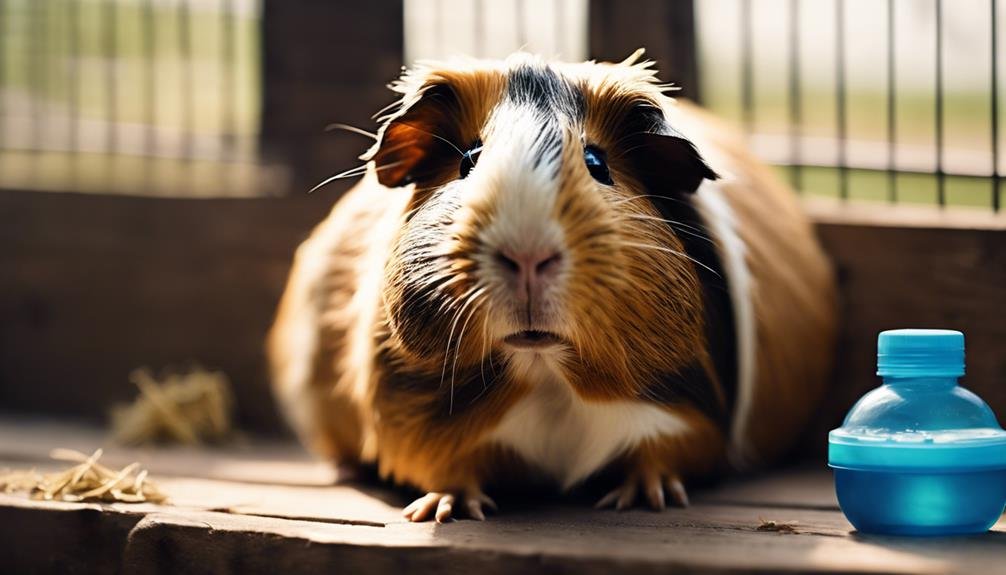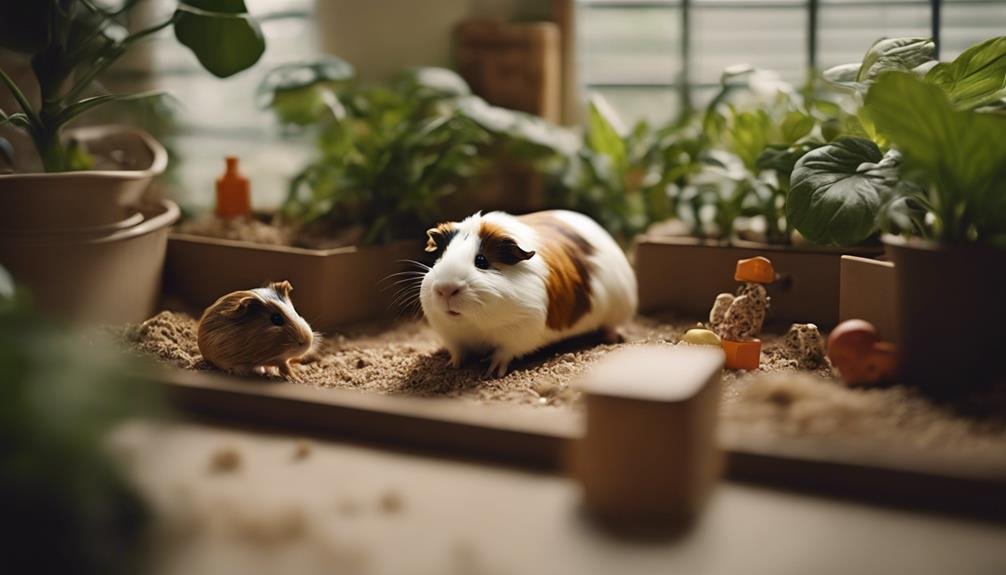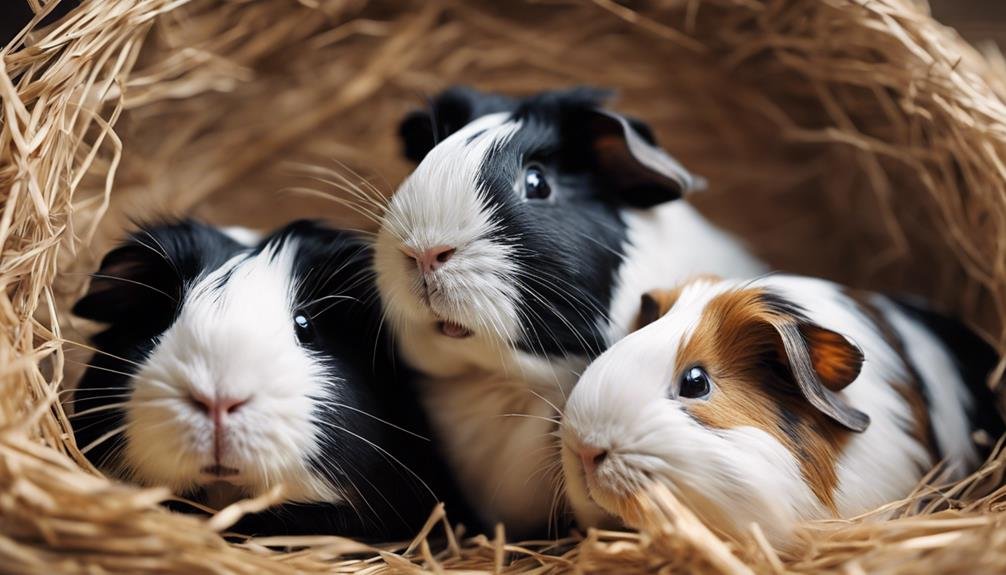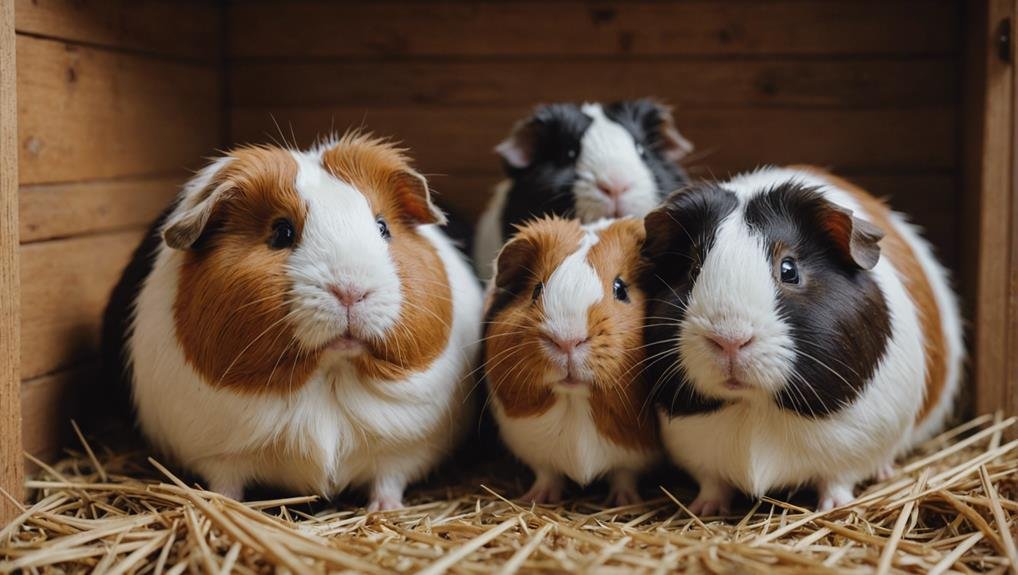You’ve probably noticed how guinea pigs captivate with their wide eyes and quirky antics, haven’t you? Originating from the Andes, these small creatures are not just cute; they are steeped in a rich history that dates back to 5000 BCE. As you consider adopting one, it’s important to understand their specific needs and behaviors. Each aspect of their care is essential to their well-being, from their diet to their social interactions. Now, imagine the nuances of their daily care and the common misconceptions that might challenge your perspective as a potential pet owner. Curious to uncover more?
Key Takeaways
- Guinea pigs originated in the Andean region of South America and were first domesticated around 5000 BCE.
- They typically measure 8 to 10 inches long and have various coat colors and patterns.
- Common health issues include dental problems and respiratory infections, requiring regular vet check-ups.
- Their diet should include fresh hay, Vitamin C-rich vegetables, and occasional fruit treats.
- Guinea pigs are social animals that communicate through sounds and require companionship and daily interaction.
Origins and History


Guinea pigs originated in the Andean region of South America, where they were first domesticated around 5000 BCE. You might find it fascinating that these adorable creatures, also known as cavy or cuy, have a history deeply intertwined with human culture in this area. The domestication timeline of guinea pigs reveals that they weren’t only pets but crucial in various aspects of Andean societies.
Tracing back to their wild ancestors, guinea pigs were once free-roaming creatures, adept at surviving in their harsh native environments. Their domestication was gradual as people realized their value beyond companionship. These ancestors resembled the guinea pigs you know today but were likely leaner and more agile, adaptations to their wild lifestyle.
Understanding how guinea pigs evolved from wild rodents to domesticated pets gives you a glimpse into early human innovation and adaptability. By domesticating guinea pigs, ancient Andeans not only secured a steady food source but also began the journey of these creatures into family homes worldwide. Today, while they’re loved as gentle and friendly pets, their extensive history proves their resilience and the enduring human-animal bond.
Physical Characteristics
Now, let’s explore the distinctive physical characteristics that make guinea pigs unique and beloved pets. You’ll be fascinated by their variety and charm!
- Size Comparison: Typically, guinea pigs measure 8 to 10 inches in length, making them compact enough to handle comfortably, yet they’re robust compared to smaller rodents.
- Color Variations: They boast a stunning array of color patterns, including solid, agouti, brindle, and roan. This diversity allows you to choose a pet that truly matches your style.
- Fur Types: Their coats can vary widely, from short and smooth to long and flowing and even curly, each offering a distinct feel and appearance.
- Eyes: Bright and alert, their eyes come in various shades correlating with their fur color, adding to their expressive faces.
- Ears: Unlike the pointed ears of many rodents, guinea pigs have petal-shaped ears that are soft and slightly drooped, enhancing their cuddly appearance.
These features combine to give guinea pigs their irresistible appeal. Whether you’re drawn to a sleek, shiny coat or the whimsical charm of curls, there’s a guinea pig just waiting to capture your heart!
Common Health Issues


Despite their hardy nature, guinea pigs can develop several health issues you should know about. Among these, dental problems are particularly common. Their teeth continuously grow throughout their lives, leading to overgrowth if not properly worn down. You’ll notice signs such as difficulty eating or drooling if their teeth are causing discomfort. Regular check-ups with a vet can help manage this condition effectively.
Respiratory infections are another concern for guinea pig owners. These small pets are susceptible to airborne bacteria and viruses, especially if their living conditions aren’t ideal. Signs that your guinea pig might be suffering from a respiratory infection include sneezing, wheezing, and a discharge from the nose or eyes. Maintaining clean and well-ventilated living spaces for your pets is essential to help prevent the onset of these infections.
You mustn’t overlook these issues, as they can lead to more severe health problems if left untreated. Regular visits to the vet for check-ups can help catch and address these issues early, ensuring that your guinea pig remains healthy and happy. Remember, prevention is always better than cure, so keep a close eye on their health and environment.
Diet and Nutrition
Understanding your guinea pig’s dietary needs is crucial for maintaining their overall health and vitality. A balanced diet supports their physical well-being and prevents common health issues, including food allergies. You must know them and what to avoid to guarantee they stay happy and healthy.
Here are the key components of a proper guinea pig diet:
- Fresh hay should be the bulk of their diet, providing the necessary fiber for digestive health.
- Vitamin C-rich vegetables: Guinea pigs can’t produce Vitamin C, so include bell peppers, broccoli, and kale.
- Pellets: Use high-quality, timothy hay-based pellets without added seeds or colored bits.
- Freshwater: Always available and refreshed daily to keep them hydrated.
- Treat options: Offer fruits like blueberries or sliced apples sparingly as treats; too much can lead to obesity or diabetes.
Be cautious with treatment options, as guinea pigs can develop food allergies or sensitivities. Always introduce new foods gradually and monitor their reaction. Keeping a close eye on their diet will help you catch any signs of distress early, ensuring your furry friend remains in top shape.
Housing and Environment


Creating an appropriate living space for your guinea pig is essential for their health and happiness. You’ll want to ensure their enclosure is spacious and safe, providing plenty of room for them to move around. A general rule is to provide at least 7.5 square feet of cage space for one guinea pig, but more is always better, especially if you plan to add more guinea pigs.
When it comes to bedding options, you’ve got several choices. Paper-based bedding is highly absorbent and dust-free, making it ideal for guinea pigs’ sensitive respiratory systems. Avoid cedar or pine wood shavings, as the oils and scents can harm your pet. Instead, opt for aspen shavings if you prefer wood-based products.
Temperature control is important; guinea pigs are sensitive to drafts and extreme temperatures. The ideal temperature range for your guinea pig’s environment is between 65 and 75 degrees Fahrenheit. Ensure their cage is placed away from direct sunlight, radiators, and windows to avoid sudden temperature changes. Additionally, consider using a room thermometer to check the environment consistently. By managing these aspects carefully, you’ll create a comfortable and stimulating home for your guinea pigs.
Social Behavior
Guinea pigs are naturally social creatures that thrive in the company of their kind. If you’ve observed them closely, you’ll notice that their social interactions are quite sophisticated. Understanding their group dynamics can enhance their well-being and your enjoyment as you watch them interact.
Here’s what you should know about their social behavior:
- Group Dynamics: Guinea pigs establish a hierarchy within their group, which helps maintain order and reduce conflicts. Watching this hierarchy form can be fascinating; it involves a series of subtle behaviors and vocal communications.
- Vocal Communication: They use a variety of sounds to communicate with each other, each having specific meanings, from wheeking when excited or hungry to purring when content; their vocalizations are essential for interaction.
- Playful Behavior: They often engage in playful activities like chasing each other or gently wrestling, which are important for social bonding and physical health.
- Comfort in Numbers: Guinea pigs feel more secure and are generally happier in groups rather than alone. This safety in numbers helps reduce stress and anxiety.
- Observing Humans: Surprisingly, they also interact with their human caregivers. You might find them following you or responding when you talk to them.
Understanding these aspects of their social behavior can help you provide a happier, healthier environment for your guinea pigs.
Breeding and Reproduction


Breeding guinea pigs typically involves careful consideration of genetics, health, and social compatibility. You’ll need to ensure that both the male and female guinea pigs you’re pairing are healthy and have beneficial traits for breeding. It’s not just about having cute babies but promoting a healthy lineage.
The gestation period for a guinea pig is about 59 to 72 days, longer than many other small rodents. You’ll need to provide the expecting mother with extra care, including a nutritious diet and a calm, comfortable environment during this time. It’s important because stress can lead to health issues for her and the pups.
Birth complications, though not overly common, can occur. These might include difficulties in delivering the pups or health troubles post-birth. You should be prepared for such situations by having a relationship with a veterinarian with experience with guinea pigs. This preparation ensures that you can get help quickly if needed.
Choosing the Right Pet
Choosing the right guinea pig as a pet necessitates evaluating your lifestyle, space, and the time you can devote to their care. Guinea pigs are charming and friendly, but they’re not the ideal choice for everyone. You’ve got to assess several key factors before bringing one home.
Here’s what you should think about:
- Allergy Evaluations: Are you or any family member allergic to pets? Guinea pigs can trigger allergies, so checking this before deciding is important.
- Time Dedication: Can you commit to daily interaction and care? Guinea pigs require regular feeding, cleaning, and social time.
- Space Requirements: Do you have enough room for a proper cage? They need space to move around and exercise.
- Social Needs: Guinea pigs are social creatures and often thrive in pairs. Will you be getting more than one to keep them company?
- Financial Accountability: Are you ready to commit to vet visits, proper diet, and cage maintenance?
If you have the space and are not worried about allergies, a guinea pig might be a great addition to your home. Remember, they depend on you for their well-being, so ensure you’re up for the task!
Conclusion
As you consider adding a guinea pig to your family, remember their rich history and unique needs.
- Guarantee they have a spacious environment, a balanced diet, and regular social interaction to thrive.
- Pay attention to their health, watch for common issues, and choose a pet that complements your lifestyle.
- With proper care, your guinea pig will be a joyful and playful companion, bringing a touch of the Andean spirit into your home.

